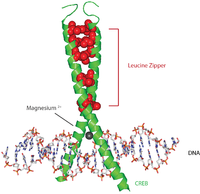
Photo from wikipedia
ETHNOPHARMACOLOGICAL RELEVANCE Areca Thirteen Pill, also called Gao You-13 (GY-13), is a traditional Mongolian herbal formula and has been extensively used to treat depression in Mongolian areas, which belongs to… Click to show full abstract
ETHNOPHARMACOLOGICAL RELEVANCE Areca Thirteen Pill, also called Gao You-13 (GY-13), is a traditional Mongolian herbal formula and has been extensively used to treat depression in Mongolian areas, which belongs to Heyi disease in Mongolian medicine. Major depressive disorder is a serious psychiatric disease, only one-third of individuals with depression are responsive to current antidepressants in clinic. Growing attention has been attracted by traditional herbal medicines in fighting depression because they are considered safer alternatives to pharmacotherapy. AIM OF THE STUDY To reveal the mechanism of GY-13 in the treatment of depression. MATERIALS AND METHODS The rat depression model was established by chronic unpredictable mild stress (CUMS), and primary hippocampal neurons were used to construct a glutamate-induced excitotoxicity model. The antidepressant effect of GY-13 was then assessed by performing sucrose preference tests, open field tests, and body weight measurements on rats. The expression of cAMP and PKA, mRNA levels of brain-derived neurotrophic factor (BDNF) and cAMP response element binding protein (CREB), and hippocampal neuronal apoptosis were measured. RESULTS The results indicate that GY-13 significantly improves depression-like behavior, rescues decreased cAMP, PKA, recovers the mRNA levels of CREB and BDNF, and increases the proliferative activity of hippocampus. In addition, blockade of PKA reverses the effects of GY-13 treatment on CREB mRNA, BDNF mRNA levels. In vitro, GY-13 treatment increased hippocampal proliferative activity and attenuated Glu-induced apoptosis of hippocampal neurons as well as reduced CREB mRNA and BDNF mRNA expression levels. CONCLUSIONS Our research demonstrated that GY-13 treatment exerted a potent antidepressant action via activation of cAMP/CREB/BDNF signaling pathway, promoting proliferation, and suppressing apoptosis. This research provides molecular biological ground for developing GY-13 into a potent alternative for the intervention of depression.
Journal Title: Journal of ethnopharmacology
Year Published: 2022
Link to full text (if available)
Share on Social Media: Sign Up to like & get
recommendations!